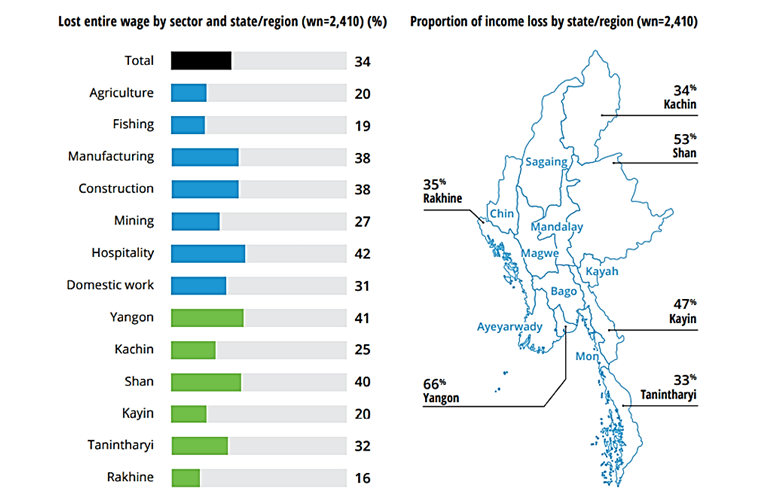Photo credit: Hamilton Medical
To better understand working conditions in a labour market and help better inform interventions and measure progress on labour conditions, Rapid Asia carried out a recent study for UNOPS in Myanmar. Part of the study examined the impact COVID-19 had on low-skilled workers.
When the COVID-19 pandemic first spread across Southeast Asia in early 2020, Myanmar suffered much less than other countries in the region. Infections remained low, and Myanmar’s response to the COVID-19 pandemic was considered successful from a public health perspective. The second outbreak in September 2020 proved to be much more severe, but Myanmar avoided a full-blown economic recession.
However, the picture of resilience presented by Myanmar masked a darker reality. The implementation of strict lockdown and closing of many businesses substantially increased the vulnerability of low-income workers, including internal migrant workers. According to the last national census in 2014, there are around 9.4 million internal migrants in Myanmar. Internal migrants are generally young men and women who relocate to find better job opportunities. They typically come from poor rural households, and many of them find work in hospitality, mining, and manufacturing.
The study found several ways in which COVID-19 negatively impacted low-skilled workers in Myanmar. The most significant impact is related to loss of income and employment. Nearly three-quarters of low-skilled workers reported some reduction in income during COVID-19, while a little less than half had lost their jobs entirely. At the time of the survey, one-third of workers reported losing their entire wage in the previous month. Workers in hospitality, manufacturing, and construction had been hit the hardest. This situation was reflected in an interview with a worker in the garment industry, the largest export industry in Myanmar and a significant employer for low-skilled workers. The worker explained:
“The workers from another Chinese factory requested their boss to raise their daily wage, but the factory owner used COVID-19 as an excuse to shut down the factory and did not pay their wages before returning to China.”
The loss of income for low-skilled workers, coupled with a lack of savings, has threatened their well-being, and has led to some workers taking on unsustainable debt levels. Others are forced to engage in exploitative forms of work to survive.

Figure 1. Impact of COVID-19 on income by sector and region
The pandemic has also affected the ability of internal migrants to send money home. Among the workers surveyed who had been sending remittances before COVID-19, nearly three-quarters reported that they had reduced the amounts they were remitting. This is especially troubling since many migrant households and communities are often entirely dependent on these remittances.
In response to the pandemic, the government of Myanmar developed an ambitious COVID-19 Economic Relief Plan (CERP). However, concerns were raised that the government’s financial support for vulnerable workers was inadequate, particularly in substantive action to provide social protection. The survey confirmed this concern, and showed that the most common forms of government support received by low-skilled workers were food rations (38 per cent) and public health information (30 per cent), but no financial support.
The case of Myanmar provides several lessons that can be applied to protect low-skilled workers in other countries.
- Enforcing minimum wage standards and social and labour protections to support vulnerable low-skilled workers from exploitative situations will allow them to continue supporting their households.
- Developing a more inclusive policy development mechanism based on understanding the situation low-skilled workers face during a pandemic will increase the impact of future aid and support efforts.
- Increasing the availability of credible information through trusted local civil society and labour organizations, working in partnership with labour authorities is a proven strategy for expanding the reach and quality of information.
If you found this article useful, please remember to ‘Like’ and share on social media, and hit the ‘Follow’ button never to miss an article. Download the full report here.
About the authors: Daniel Lindgren is the Founder of Rapid Asia Co., Ltd. a social research and consulting firm based in Bangkok specializing in evaluations for programs, projects, social marketing campaigns and other social development initiatives. David Young is an independent consultant working with Rapid Asia as a member of their expert panel of consultants. Learn more about our work at www.rapid-asia.com

